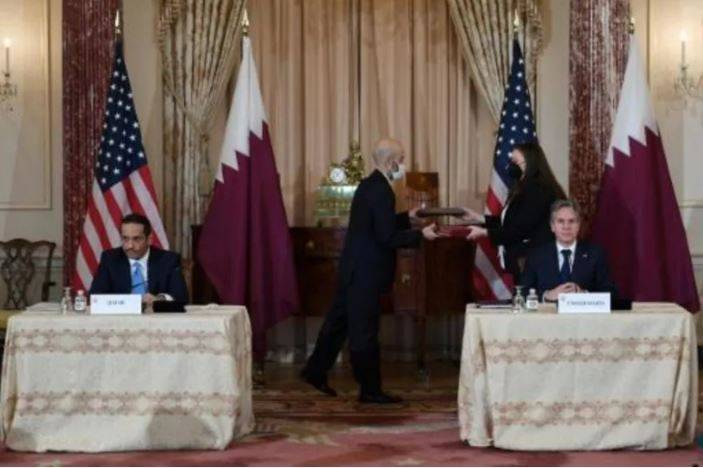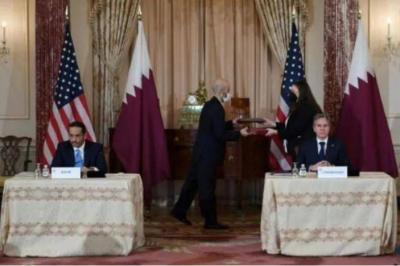The United States announced on Friday that it will establish a mission to manage its interests in Afghanistan, administered by Qatar, to create a direct line for assisting American citizens and communicating with the Taliban, after Washington closed its embassy in Kabul following the group's takeover. This step represents a diplomatic gain for Qatar, which is considered a key ally of the U.S. regarding Afghanistan. U.S. Secretary of State Antony Blinken signed an agreement in Washington with Qatari Foreign Minister Sheikh Mohammed bin Abdulrahman Al Thani that "solidifies Qatar's role as a protector (of U.S. interests) in Afghanistan," where the Gulf state will set up a section for U.S. interest representation at its embassy in Kabul.
The United States has expressed cautious optimism about dialogue with the Taliban but made it clear that reopening the embassy, which would signify recognition of its regime, is not on the table at the moment. Qatar, which hosts a major U.S. military base, has played a crucial role in diplomacy and evacuation efforts as the U.S. wrapped up its 20-year military presence in Afghanistan. Nearly half of the Westerners and Afghan allies evacuated during the withdrawal, totaling 124,000, passed through Qatar. Qatari officials previously hosted negotiations between Washington and the Taliban that resulted in the February 2020 agreement outlining the U.S. withdrawal from Afghanistan. Since the Taliban took power, the U.S. has shifted its embassy operations in Kabul to Qatar.
Blinken expressed gratitude to Qatari leadership and support in Afghanistan, emphasizing that the partnership extends far beyond that. He added that "Qatar is a vital partner in promoting regional stability" while also noting Qatar's assistance to the Palestinians.
Regarding engagement with the Taliban, Blinken mentioned that the State Department has reached out to all American citizens and legal residents still in Afghanistan and organized the departure of over 580 individuals since the Taliban's return to power. However, the issue remains politically sensitive. Washington closed its embassy in Kabul, one of the largest diplomatic missions in the world, in August after it became clear that the previous Afghan government, backed by the West, was on the verge of collapse, leading diplomats to destroy sensitive materials and lower the flag.
Despite the Taliban's extreme rule between 1996 and 2001 and the years-long war against Washington, U.S. officials have shown cautious optimism about engaging with the Taliban, indicating that its members are generally upholding their commitments allowing people to leave the country. However, the U.S. has ruled out any immediate recognition of the Taliban regime or reopening its embassy in Kabul, preferring to wait and see if the Taliban will adhere to its commitments on other issues, including its treatment of women and preventing Al-Qaeda from establishing operations in Afghanistan.
U.S. special envoy to Afghanistan, Thomas West, met Thursday in Islamabad with Taliban Foreign Minister Amir Khan Mottaki, along with representatives from Pakistan, Russia, and China, three countries encouraging greater cooperation with the Taliban. A joint statement called for continued commitment to promote "moderate and cautious policies." Qatar has sent 15 charter flights to Afghanistan since the Taliban’s victory and, along with Turkey, offered to rehabilitate Kabul airport. Al Thani stated about Afghanistan, "They are in urgent need of assistance, especially with winter approaching." He added, "Abandoning Afghanistan would be a grave mistake." He continued, "We believe that engaging with the Taliban, given that they are in power now, is crucial for ensuring that our humanitarian efforts proceed smoothly."
### Halting Normalization with Syria
On another note, the Qatari foreign minister expressed hope for halting the normalization of relations with the regime of President Bashar al-Assad in statements following the visit of his Emirati counterpart Abdullah bin Zayed to Damascus. During a joint press conference with Blinken, the Qatari minister said, "We hope that nations do not feel encouraged to take further steps toward the Syrian regime." Blinken reiterated U.S. concerns over normalization with Assad's regime. Sheikh Mohammed bin Abdulrahman Al Thani added that "Qatar's position will remain unchanged; we do not see any serious steps from the Assad regime showing its commitment to addressing the damage it has caused to its country and people." He remarked that "As long as no serious steps are taken, we believe that changing our position is not a viable option." However, the Qatari minister also mentioned that other countries have "sovereign rights" to make their own decisions regarding Syria.
The Emirati foreign minister, Sheikh Abdullah bin Zayed Al Nahyan, met Assad in Damascus on Tuesday, signaling a clear momentum to restore relations. Blinken stated, "We are concerned about the signals sent by some of these visits and engagements." He continued, "I would simply urge all our partners to remember the crimes committed by the Assad regime and that continue to be committed." The Biden administration has focused on humanitarian relief in Syria rather than military solutions but has pledged not to normalize ties with the regime and continues to advocate for a peaceful settlement. The Caesar Act, a U.S. law effective last year, imposes sanctions on anyone cooperating with Assad to rebuild Syria, as part of an effort to encourage accountability for rights violations.




